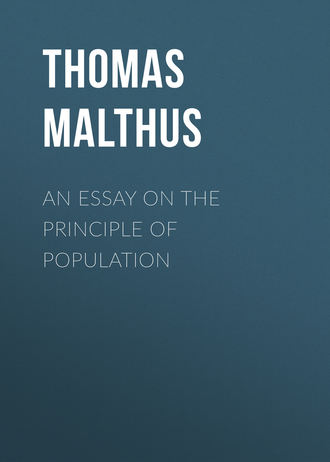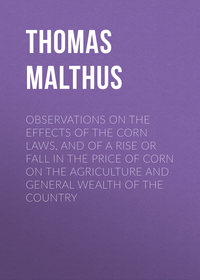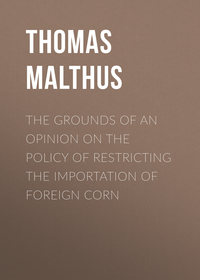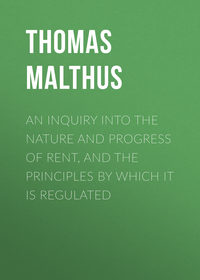 полная версия
полная версияAn Essay on the Principle of Population
The constancy of the laws of nature and of effects and causes is the foundation of all human knowledge, though far be it from me to say that the same power which framed and executes the laws of nature may not change them all 'in a moment, in the twinkling of an eye.' Such a change may undoubtedly happen. All that I mean to say is that it is impossible to infer it from reasoning. If without any previous observable symptoms or indications of a change, we can infer that a change will take place, we may as well make any assertion whatever and think it as unreasonable to be contradicted in affirming that the moon will come in contact with the earth tomorrow, as in saying that the sun will rise at its usual time.
With regard to the duration of human life, there does not appear to have existed from the earliest ages of the world to the present moment the smallest permanent symptom or indication of increasing prolongation. The observable effects of climate, habit, diet, and other causes, on length of life have furnished the pretext for asserting its indefinite extension; and the sandy foundation on which the argument rests is that because the limit of human life is undefined; because you cannot mark its precise term, and say so far exactly shall it go and no further; that therefore its extent may increase for ever, and be properly termed indefinite or unlimited. But the fallacy and absurdity of this argument will sufficiently appear from a slight examination of what Mr Condorcet calls the organic perfectibility, or degeneration, of the race of plants and animals, which he says may be regarded as one of the general laws of nature.
I am told that it is a maxim among the improvers of cattle that you may breed to any degree of nicety you please, and they found this maxim upon another, which is that some of the offspring will possess the desirable qualities of the parents in a greater degree. In the famous Leicestershire breed of sheep, the object is to procure them with small heads and small legs. Proceeding upon these breeding maxims, it is evident that we might go on till the heads and legs were evanescent quantities, but this is so palpable an absurdity that we may be quite sure that the premises are not just and that there really is a limit, though we cannot see it or say exactly where it is. In this case, the point of the greatest degree of improvement, or the smallest size of the head and legs, may be said to be undefined, but this is very different from unlimited, or from indefinite, in Mr Condorcet's acceptation of the term. Though I may not be able in the present instance to mark the limit at which further improvement will stop, I can very easily mention a point at which it will not arrive. I should not scruple to assert that were the breeding to continue for ever, the head and legs of these sheep would never be so small as the head and legs of a rat.
It cannot be true, therefore, that among animals, some of the offspring will possess the desirable qualities of the parents in a greater degree, or that animals are indefinitely perfectible.
The progress of a wild plant to a beautiful garden flower is perhaps more marked and striking than anything that takes place among animals, yet even here it would be the height of absurdity to assert that the progress was unlimited or indefinite.
One of the most obvious features of the improvement is the increase of size. The flower has grown gradually larger by cultivation. If the progress were really unlimited it might be increased ad infinitum, but this is so gross an absurdity that we may be quite sure that among plants as well as among animals there is a limit to improvement, though we do not exactly know where it is. It is probable that the gardeners who contend for flower prizes have often applied stronger dressing without success. At the same time it would be highly presumptuous in any man to say that he had seen the finest carnation or anemone that could ever be made to grow. He might however assert without the smallest chance of being contradicted by a future fact, that no carnation or anemone could ever by cultivation be increased to the size of a large cabbage; and yet there are assignable quantities much greater than a cabbage. No man can say that he has seen the largest ear of wheat, or the largest oak that could ever grow; but he might easily, and with perfect certainty, name a point of magnitude at which they would not arrive. In all these cases therefore, a careful distinction should be made, between an unlimited progress, and a progress where the limit is merely undefined.
It will be said, perhaps, that the reason why plants and animals cannot increase indefinitely in size is, that they would fall by their own weight. I answer, how do we know this but from experience?—from experience of the degree of strength with which these bodies are formed. I know that a carnation, long before it reached the size of a cabbage, would not be supported by its stalk, but I only know this from my experience of the weakness and want of tenacity in the materials of a carnation stalk. There are many substances in nature of the same size that would support as large a head as a cabbage.
The reasons of the mortality of plants are at present perfectly unknown to us. No man can say why such a plant is annual, another biennial, and another endures for ages. The whole affair in all these cases, in plants, animals, and in the human race, is an affair of experience, and I only conclude that man is mortal because the invariable experience of all ages has proved the mortality of those materials of which his visible body is made:
What can we reason, but from what we know?
Sound philosophy will not authorize me to alter this opinion of the mortality of man on earth, till it can be clearly proved that the human race has made, and is making, a decided progress towards an illimitable extent of life. And the chief reason why I adduced the two particular instances from animals and plants was to expose and illustrate, if I could, the fallacy of that argument which infers an unlimited progress, merely because some partial improvement has taken place, and that the limit of this improvement cannot be precisely ascertained.
The capacity of improvement in plants and animals, to a certain degree, no person can possibly doubt. A clear and decided progress has already been made, and yet, I think, it appears that it would be highly absurd to say that this progress has no limits. In human life, though there are great variations from different causes, it may be doubted whether, since the world began, any organic improvement whatever in the human frame can be clearly ascertained. The foundations, therefore, on which the arguments for the organic perfectibility of man rest, are unusually weak, and can only be considered as mere conjectures. It does not, however, by any means seem impossible that by an attention to breed, a certain degree of improvement, similar to that among animals, might take place among men. Whether intellect could be communicated may be a matter of doubt: but size, strength, beauty, complexion, and perhaps even longevity are in a degree transmissible. The error does not seem to lie in supposing a small degree of improvement possible, but in not discriminating between a small improvement, the limit of which is undefined, and an improvement really unlimited. As the human race, however, could not be improved in this way, without condemning all the bad specimens to celibacy, it is not probable that an attention to breed should ever become general; indeed, I know of no well-directed attempts of this kind, except in the ancient family of the Bickerstaffs, who are said to have been very successful in whitening the skins and increasing the height of their race by prudent marriages, particularly by that very judicious cross with Maud, the milk-maid, by which some capital defects in the constitutions of the family were corrected.
It will not be necessary, I think, in order more completely to shew the improbability of any approach in man towards immortality on earth, to urge the very great additional weight that an increase in the duration of life would give to the argument of population.
Many, I doubt not, will think that the attempting gravely to controvert so absurd a paradox as the immortality of man on earth, or indeed, even the perfectibility of man and society, is a waste of time and words, and that such unfounded conjectures are best answered by neglect. I profess, however, to be of a different opinion. When paradoxes of this kind are advanced by ingenious and able men, neglect has no tendency to convince them of their mistakes. Priding themselves on what they conceive to be a mark of the reach and size of their own understandings, of the extent and comprehensiveness of their views, they will look upon this neglect merely as an indication of poverty, and narrowness, in the mental exertions of their contemporaries, and only think that the world is not yet prepared to receive their sublime truths.
On the contrary, a candid investigation of these subjects, accompanied with a perfect readiness to adopt any theory warranted by sound philosophy, may have a tendency to convince them that in forming improbable and unfounded hypotheses, so far from enlarging the bounds of human science, they are contracting it, so far from promoting the improvement of the human mind, they are obstructing it; they are throwing us back again almost into the infancy of knowledge and weakening the foundations of that mode of philosophising, under the auspices of which science has of late made such rapid advances. The present rage for wide and unrestrained speculation seems to be a kind of mental intoxication, arising, perhaps, from the great and unexpected discoveries which have been made of late years, in various branches of science. To men elate and giddy with such successes, every thing appeared to be within the grasp of human powers; and, under this illusion, they confounded subjects where no real progress could be proved with those where the progress had been marked, certain, and acknowledged. Could they be persuaded to sober themselves with a little severe and chastised thinking, they would see, that the cause of truth, and of sound philosophy, cannot but suffer by substituting wild flights and unsupported assertions for patient investigation, and well authenticated proofs.
Mr Condorcet's book may be considered not only as a sketch of the opinions of a celebrated individual, but of many of the literary men in France at the beginning of the Revolution. As such, though merely a sketch, it seems worthy of attention.
CHAPTER 10
Mr Godwin's system of equality—Error of attributing all the vices of mankind to human institutions—Mr Godwin's first answer to the difficulty arising from population totally insufficient—Mr Godwin's beautiful system of equality supposed to be realized—Its utter destruction simply from the principle of population in so short a time as thirty years.
In reading Mr Godwin's ingenious and able work on political justice, it is impossible not to be struck with the spirit and energy of his style, the force and precision of some of his reasonings, the ardent tone of his thoughts, and particularly with that impressive earnestness of manner which gives an air of truth to the whole. At the same time, it must be confessed that he has not proceeded in his inquiries with the caution that sound philosophy seems to require. His conclusions are often unwarranted by his premises. He fails sometimes in removing the objections which he himself brings forward. He relies too much on general and abstract propositions which will not admit of application. And his conjectures certainly far outstrip the modesty of nature.
The system of equality which Mr Godwin proposes is, without doubt, by far the most beautiful and engaging of any that has yet appeared. An amelioration of society to be produced merely by reason and conviction wears much more the promise of permanence than any change effected and maintained by force. The unlimited exercise of private judgement is a doctrine inexpressibly grand and captivating and has a vast superiority over those systems where every individual is in a manner the slave of the public. The substitution of benevolence as the master-spring and moving principle of society, instead of self-love, is a consummation devoutly to be wished. In short, it is impossible to contemplate the whole of this fair structure without emotions of delight and admiration, accompanied with ardent longing for the period of its accomplishment. But, alas! that moment can never arrive. The whole is little better than a dream, a beautiful phantom of the imagination. These 'gorgeous palaces' of happiness and immortality, these 'solemn temples' of truth and virtue will dissolve, 'like the baseless fabric of a vision', when we awaken to real life and contemplate the true and genuine situation of man on earth. Mr Godwin, at the conclusion of the third chapter of his eighth book, speaking of population, says:
There is a principle in human society, by which population is perpetually kept down to the level of the means of subsistence. Thus among the wandering tribes of America and Asia, we never find through the lapse of ages that population has so increased as to render necessary the cultivation of the earth.
This principle, which Mr Godwin thus mentions as some mysterious and occult cause and which he does not attempt to investigate, will be found to be the grinding law of necessity, misery, and the fear of misery.
The great error under which Mr Godwin labours throughout his whole work is the attributing almost all the vices and misery that are seen in civil society to human institutions. Political regulations and the established administration of property are with him the fruitful sources of all evil, the hotbeds of all the crimes that degrade mankind. Were this really a true state of the case, it would not seem a hopeless task to remove evil completely from the world, and reason seems to be the proper and adequate instrument for effecting so great a purpose. But the truth is, that though human institutions appear to be the obvious and obtrusive causes of much mischief to mankind, yet in reality they are light and superficial, they are mere feathers that float on the surface, in comparison with those deeper seated causes of impurity that corrupt the springs and render turbid the whole stream of human life.
Mr Godwin, in his chapter on the benefits attendant on a system of equality, says:
The spirit of oppression, the spirit of servility, and the spirit of fraud, these are the immediate growth of the established administration of property. They are alike hostile to intellectual improvement. The other vices of envy, malice, and revenge are their inseparable companions. In a state of society where men lived in the midst of plenty and where all shared alike the bounties of nature, these sentiments would inevitably expire. The narrow principle of selfishness would vanish. No man being obliged to guard his little store or provide with anxiety and pain for his restless wants, each would lose his individual existence in the thought of the general good. No man would be an enemy to his neighbour, for they would have no subject of contention, and, of consequence, philanthropy would resume the empire which reason assigns her. Mind would be delivered from her perpetual anxiety about corporal support, and free to expatiate in the field of thought, which is congenial to her. Each would assist the inquiries of all.
This would, indeed, be a happy state. But that it is merely an imaginary picture, with scarcely a feature near the truth, the reader, I am afraid, is already too well convinced.
Man cannot live in the midst of plenty. All cannot share alike the bounties of nature. Were there no established administration of property, every man would be obliged to guard with force his little store. Selfishness would be triumphant. The subjects of contention would be perpetual. Every individual mind would be under a constant anxiety about corporal support, and not a single intellect would be left free to expatiate in the field of thought.
How little Mr Godwin has turned the attention of his penetrating mind to the real state of man on earth will sufficiently appear from the manner in which he endeavours to remove the difficulty of an overcharged population. He says:
The obvious answer to this objection, is, that to reason thus is to foresee difficulties at a great distance. Three fourths of the habitable globe is now uncultivated. The parts already cultivated are capable of immeasurable improvement. Myriads of centuries of still increasing population may pass away, and the earth be still found sufficient for the subsistence of its inhabitants.
I have already pointed out the error of supposing that no distress and difficulty would arise from an overcharged population before the earth absolutely refused to produce any more. But let us imagine for a moment Mr Godwin's beautiful system of equality realized in its utmost purity, and see how soon this difficulty might be expected to press under so perfect a form of society. A theory that will not admit of application cannot possibly be just.
Let us suppose all the causes of misery and vice in this island removed. War and contention cease. Unwholesome trades and manufactories do not exist. Crowds no longer collect together in great and pestilent cities for purposes of court intrigue, of commerce, and vicious gratifications. Simple, healthy, and rational amusements take place of drinking, gaming, and debauchery. There are no towns sufficiently large to have any prejudicial effects on the human constitution. The greater part of the happy inhabitants of this terrestrial paradise live in hamlets and farmhouses scattered over the face of the country. Every house is clean, airy, sufficiently roomy, and in a healthy situation. All men are equal. The labours of luxury are at end. And the necessary labours of agriculture are shared amicably among all. The number of persons, and the produce of the island, we suppose to be the same as at present. The spirit of benevolence, guided by impartial justice, will divide this produce among all the members of the society according to their wants. Though it would be impossible that they should all have animal food every day, yet vegetable food, with meat occasionally, would satisfy the desires of a frugal people and would be sufficient to preserve them in health, strength, and spirits.
Mr Godwin considers marriage as a fraud and a monopoly. Let us suppose the commerce of the sexes established upon principles of the most perfect freedom. Mr Godwin does not think himself that this freedom would lead to a promiscuous intercourse, and in this I perfectly agree with him. The love of variety is a vicious, corrupt, and unnatural taste and could not prevail in any great degree in a simple and virtuous state of society. Each man would probably select himself a partner, to whom he would adhere as long as that adherence continued to be the choice of both parties. It would be of little consequence, according to Mr Godwin, how many children a woman had or to whom they belonged. Provisions and assistance would spontaneously flow from the quarter in which they abounded, to the quarter that was deficient. (See Bk VIII, ch. 8; in the third edition, Vol II, p. 512) And every man would be ready to furnish instruction to the rising generation according to his capacity.
I cannot conceive a form of society so favourable upon the whole to population. The irremediableness of marriage, as it is at present constituted, undoubtedly deters many from entering into that state. An unshackled intercourse on the contrary would be a most powerful incitement to early attachments, and as we are supposing no anxiety about the future support of children to exist, I do not conceive that there would be one woman in a hundred, of twenty-three, without a family.
With these extraordinary encouragements to population, and every cause of depopulation, as we have supposed, removed, the numbers would necessarily increase faster than in any society that has ever yet been known. I have mentioned, on the authority of a pamphlet published by a Dr Styles and referred to by Dr Price, that the inhabitants of the back settlements of America doubled their numbers in fifteen years. England is certainly a more healthy country than the back settlements of America, and as we have supposed every house in the island to be airy and wholesome, and the encouragements to have a family greater even than with the back settlers, no probable reason can be assigned why the population should not double itself in less, if possible, than fifteen years. But to be quite sure that we do not go beyond the truth, we will only suppose the period of doubling to be twenty-five years, a ratio of increase which is well known to have taken place throughout all the Northern States of America.
There can be little doubt that the equalization of property which we have supposed, added to the circumstance of the labour of the whole community being directed chiefly to agriculture, would tend greatly to augment the produce of the country. But to answer the demands of a population increasing so rapidly, Mr Godwin's calculation of half an hour a day for each man would certainly not be sufficient. It is probable that the half of every man's time must be employed for this purpose. Yet with such, or much greater exertions, a person who is acquainted with the nature of the soil in this country, and who reflects on the fertility of the lands already in cultivation, and the barrenness of those that are not cultivated, will be very much disposed to doubt whether the whole average produce could possibly be doubled in twenty-five years from the present period. The only chance of success would be the ploughing up all the grazing countries and putting an end almost entirely to the use of animal food. Yet a part of this scheme might defeat itself. The soil of England will not produce much without dressing, and cattle seem to be necessary to make that species of manure which best suits the land. In China it is said that the soil in some of the provinces is so fertile as to produce two crops of rice in the year without dressing. None of the lands in England will answer to this description.
Difficult, however, as it might be to double the average produce of the island in twenty-five years, let us suppose it effected. At the expiration of the first period therefore, the food, though almost entirely vegetable, would be sufficient to support in health the doubled population of fourteen millions.
During the next period of doubling, where will the food be found to satisfy the importunate demands of the increasing numbers? Where is the fresh land to turn up? Where is the dressing necessary to improve that which is already in cultivation? There is no person with the smallest knowledge of land but would say that it was impossible that the average produce of the country could be increased during the second twenty-five years by a quantity equal to what it at present yields. Yet we will suppose this increase, however improbable, to take place. The exuberant strength of the argument allows of almost any concession. Even with this concession, however, there would be seven millions at the expiration of the second term unprovided for. A quantity of food equal to the frugal support of twenty-one millions, would be to be divided among twenty-eight millions.
Alas! what becomes of the picture where men lived in the midst of plenty, where no man was obliged to provide with anxiety and pain for his restless wants, where the narrow principle of selfishness did not exist, where Mind was delivered from her perpetual anxiety about corporal support and free to expatiate in the field of thought which is congenial to her. This beautiful fabric of imagination vanishes at the severe touch of truth. The spirit of benevolence, cherished and invigorated by plenty, is repressed by the chilling breath of want. The hateful passions that had vanished reappear. The mighty law of self-preservation expels all the softer and more exalted emotions of the soul. The temptations to evil are too strong for human nature to resist. The corn is plucked before it is ripe, or secreted in unfair proportions, and the whole black train of vices that belong to falsehood are immediately generated. Provisions no longer flow in for the support of the mother with a large family. The children are sickly from insufficient food. The rosy flush of health gives place to the pallid cheek and hollow eye of misery. Benevolence, yet lingering in a few bosoms, makes some faint expiring struggles, till at length self-love resumes his wonted empire and lords it triumphant over the world.





